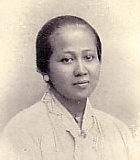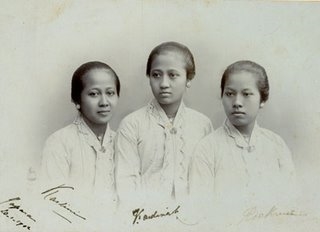 |
| Raden Ajeng Kartini (http://img01.picoodle.com/ img/img01/8/4/20/f_kartini1m_6790424.jpg) |
R.A. Kartini is famous as the greatest woman in Indonesia. She is a daughter that was born on April 21 from a wealthy family in Java about 130 years ago. Previously before Kartini was born, the women status in Indonesia was further behind than the men. They just had the duties without the rights. Their lives seemed aimless. The purpose is only one. They must get married with a man who was unknown before. Those situations were accepted by them and they considered that it was ordinary. But, Kartini could not accept it. Her soul wanted the freedom and went away from the restraint. She wished the emancipation!
Kartini’s father was a regent. He had 11 children, 6 daughters and 5 sons. One of them was Kartini. He always taught his children to learn and study about the western knowledge. Because he wanted his children to be modern like the western. Kartini grew within the wealthy family as a princess, but; in her hearts there is a love towards the poor people. She really did not like when some people showed off their wealth, otherwise she liked to divide her wealth to the people who needed it.
Previously In Indonesia, there was a tradition that if every girl had been 12 years old, they would not be permitted to study in school again. They were secluded and were not permitted to go anywhere. They must stay in the home and get ready to be a housewife. The tradition had been felt by Kartini too. She was compelled to leave her childhood because it had to be sacrificed. But, she had never felt hopeless; she still added her knowledge with her Netherlands friends. One day, Kartini asked his father, “Dad, may I continue my study? All of my Netherlands friends may study in school. Why I must be in home every day?” His father became touched. His daughter claimed nothing. She just wanted to study in school. But her father did not change his decision that he ought to obey the tradition. Kartini was sad with the decision. But, she was obedient towards her father.
Actually, she was jealous with her brother. She also wanted to study in school like him. Her brother felt sad when he heard every moment Kartini told about herself. He agreed with Kartini’s desires, but he could not do anything to help Kartini. He was just able to give many books to be read by Kartini. From many books which she read, she knew many women's lives in the other countries that were not bounded by the tradition. And then, she compared their lives with most women here, in Indonesia. Kartini felt that the women's lives in Indonesia had not been free yet and more and more left further behind. She knew that the women needed the emancipation.
 |
| Raden Ajeng Kartini and her siblings (www.lib.monash.edu.au/.../photos/photo12.jpg) |
Day by day, she also spent her empty time to write the letters for her Netherlands friends. The letters narrated about her desires to liberate all the women in Indonesia from the tradition and move the education forward. One day, Kartini met 2 Netherlands people who were sympathetic with Kartini’s desires. All the letters which had been written by Kartini would be published by them. That book actually was read by people all over the world. Until now, it has been reprinted 7 times. The title is “Letters of a Javanese Princess”. In Indonesia, is called as “Habis Gelap Terbitlah Terang” or in English, the meaning is rising the brightness, after the darkness. Her book even had been read by Eleanor Roosevelt (The wife of former President of United States).
Until the end of her life, Kartini did not stop her efforts to increase women's rights. It was shown within many schools which had been built by her. Kartini herself wanted to be a teacher and she taught about sewing, cooking, writing, and embroidery in her school. She had a desire to teach everyone especially the women and make them clever like the men. She did not want the women to follow the traditions that were not compatible with the world development.
Caused by the activities kept her busy, she got ill. To cure the diseases, she often went to the doctor and tried to get time off work. And, in the same time; a regent asked her in marriage. Kartini accepted it because she had no doubt that her husband was able to help in bringing her desires to reality. And then, many schools were built in Java. It’s not only for women, but also for men. The craftsman schools for men were built. At that time, the real education in Indonesia was begun. Unfortunately, Kartini could not see all of the results from her struggles. Her life was too short. Humans can make the plans, but God has the right to determine. After she gave birth to her first son, she died at the age of 25 years old.
She has implanted the seed in every woman's heart though she had died. Her life inspires every woman to have a certainty in the struggle of their desires. We do not have to have no hope. Now, almost all women in Indonesia have had the rights. They are not bounded by the previous traditions. They can study in school as they want or they may bring their desires to reality. All of the freedom which the women get now is the result of Kartini's efforts. Thanks to you, Kartini. You are the princess that left your fragrant name as a pioneer of women's emancipation in Indonesia.
Page created on 2/18/2008 12:00:00 AM
Last edited 2/18/2008 12:00:00 AM
